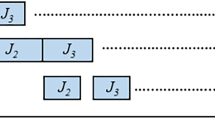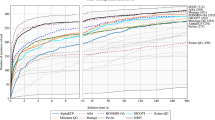Abstract
We study a generalized version of the minimum makespan jobshop problem in which multiple instances of each job are to be processed. The system starts with specified inventory levels in all buffers and finishes with some desired inventory levels of the buffers at the end of the planning horizon. A schedule that minimizes the completion time of all the operations is sought. We develop a polynomial time asymptotic approximation procedure for the problem. That is, the ratio between the value of the delivered solution and the optimal one converge into one, as the multiplicity of the problem increases. Our algorithm uses the solution of the linear relaxation of a time-indexed Mixed-Integer formulation of the problem. In addition, a heuristic method inspired by this approximation algorithm is presented and is numerically shown to out-perform known methods for a large set of standard test problems of moderate job multiplicity.
Similar content being viewed by others
Notes
We present the results of Bertsimas and Sethuraman (2002) using our notation here for the sake of comparison. In their notation, \(U_\mathrm{max}\) is bounded from above by the number of job classes (\(I\)) times the maximal processing time \(P_\mathrm{max}\) and \(J_\mathrm{max} \equiv O_\mathrm{max}\).
This may happen since, if a machine is ready at time \(t\), LPSA dispatches an available operation instance with the smallest \(\mathrm{LPS}(r,o,n)\) even if \(\mathrm{LPS}(r,o,n)>t\).
References
Adams, J., Balas, E., & Zawack, D. (1988). The shifting bottleneck procedure for job shop scheduling. Management Science, 34(3), 391–401.
Amin, J., Shafia, M. A., & Tavakkoli-Moghaddam, R. (2011). A hybrid algorithm based on particle swarm optimization and simulated annealing for a periodic job shop scheduling problem. The International Journal of Advanced Manufacturing Technology, 54(1–4), 309–322.
Beasley, J. E. (1990). Or-library, http://people.brunel.ac.uk/~mastjjb/jeb/info.html.
Bertsimas, D., & Gamarnik, D. (1999). Asymptotically optimal algorithm for job shop scheduling and packet routing. Journal of Algorithms, 33(2), 296–318.
Bertsimas, D., Gamarnik, D., & Sethuraman, J. (2003). From fluid relaxations to practical algorithms for job shop scheduling: The holding cost objective. Operational Research, 51(5), 798–813.
Bertsimas, D., & Sethuraman, J. (2002). From fluid relaxations to practical algorithms for job shop scheduling: The makespan objective. Mathematical Programming, 92(1), 61–102.
Blackstone, J. H., Phillips, D. T., & Hogg, G. L. (1982). A state-of-the-art survey of dispatching rules for manufacturing job shop operations. International Journal of Production Research, 20(1), 27–45.
Boudoukh, T., Penn, M., & Weiss, G. (2001). Scheduling job shop with some identical or similar jobs. Journal of Scheduling, 4, 177–199.
Brauner, N., Crama, Y., Grigoriev, A., & van de Klundert, J. (2005). A framework for the complexity of high-multiplicity scheduling problems. Journal of Combinatorial Optimization, 9(3), 313–323.
Chekuri, C., & Khanna, S. (2004). Handbook of sheduling: Algorithms, models, and performance analysis. Approximation algorithms for minimizing average weighted completion time (Vol. 33431, pp. 11-1–11-30). Boca Raton, FL: CRC Press.
Correa, J. R., Wagner, M. R. (2005). Lp-based online scheduling: From single to parallel machines. In M. Jnger & V. Kaibel (Eds.), Integer programming and combinatorial optimization. Lecture Notes in Computer Science, vol. 3509 (pp. 196–209). Berlin Heidelberg: Springer
Dai, J. G., & Weiss, G. (1996). Stability and instability of fluid models for certain re-entrant lines. Mathematics of Operations Research, 21(1), 115–134.
Dai, J. G., & Weiss, G. (2002). A fluid heuristic for minimizing makespan in job-shops. Operations Research, 50(4), 692–707.
Goemans, M., Queyranne, M., Schulz, A. S., Skutella, M., & Wang, Y. (2002). Single machine scheduling with release dates. SIAM Journal on Discrete Mathematics, 15(2), 165–192.
Goldberg, L. A., Mike, P., Aravind S., Elizabeth S. (1997). Better approximation guarantees for job-shop scheduling (pp. 599–608). In Proceedings of the Eighth Annual ACM-SIAM Symposium on Discrete Algorithms. Philadelphia, PA: SODA ’97, Society for Industrial and Applied Mathematics.
Hall, N. G., Lee, T. E., & Posner, M. E. (2002). The complexity of cyclic shop scheduling problems. Journal of Scheduling, 5(4), 307–327.
Kechadi, M-Tahar, & Low, Kok Seng. (2013). Recurrent neural network approach for cyclic job shop scheduling problem. Journal of Manufacturing Systems, 32(4), 689–699.
Kimbrel, T., & Sviridenko, M. (2008). High-multiplicity cyclic job shop scheduling. Operations Research Letters, 36(5), 574–578.
Lee, T. E., & Posner, M. E. (1997). Performance measures and schedule patterns in periodic job shops. Operational Research, 45(1), 72–91.
Lenstra, J. K., & Rinnooy-Kan, A. H. G. (1979). Computational complexity of discrete optimization problems. Annals of Discrete Mathematics, 4(8), 121–140.
Leung, J. M. Y., Zhang, G., Yang, X., Mak, R., & Lam, K. (2004). Optimal cyclic multi-hoist scheduling: A mixed integer programming approach. Operations Research, 52(6), 965976.
Nowicki, E., & Smutnicki, C. (1996). A fast taboo search algorithm for the job shop problem. Management Science, 42(6), 797–813.
Savelsbergh, Martin W. P., Uma, R. N., Joel W. (1998). An experimental study of Lp-based approximation algorithms for scheduling problems (pp. 453–462). In Proceedings of the Ninth Annual ACM-SIAM Symposium on Discrete Algorithms. Philadelphia, PA: SODA ’98, Society for Industrial and Applied Mathematics.
Sevast’janov, S. V. (1994). On some geometric methods in scheduling theory: A survey. Discrete Applied Mathematics, 55(1), 59–82.
Shmoys, D. B., Stein, C., & Wein, J. (1994). Improved approximation algorithms for shop scheduling problems. SIAM Journal Computing, 23(3), 617–632.
Skutella, M. (2006). List scheduling in order of \(\alpha \)-points on a single machine. Lecture Notes in Computer Science, 3484 250291.
Sotskov, Y. N., & Shakhlevich, N. V. (1995). Np-hardness of shop-scheduling problems with three jobs. Discrete Applied Mathematics, 59(3), 237–266.
Weiss, G. (2008). A simplex based algorithm to solve separated continuous linear programs. Mathematical Programming Series A, 115(1), 151–198.
Williamson, D. P., Hall, L. A., Hoogeveen, J. A., Hurkens, C. A. J., Lenstra, J. K., Sevast’janov, S. V., et al. (1997). Short shop schedules. Operations Research, 45(2), 288–294.
Author information
Authors and Affiliations
Corresponding author
Rights and permissions
About this article
Cite this article
Masin, M., Raviv, T. Linear programming-based algorithms for the minimum makespan high multiplicity jobshop problem. J Sched 17, 321–338 (2014). https://doi.org/10.1007/s10951-014-0376-y
Received:
Accepted:
Published:
Issue Date:
DOI: https://doi.org/10.1007/s10951-014-0376-y




